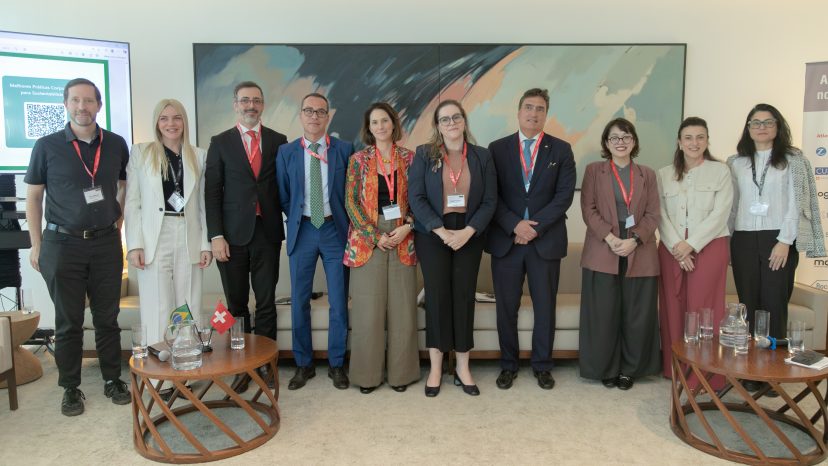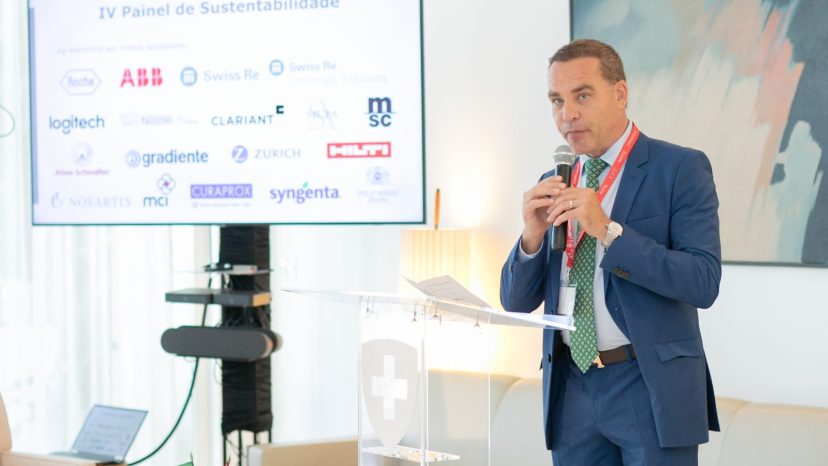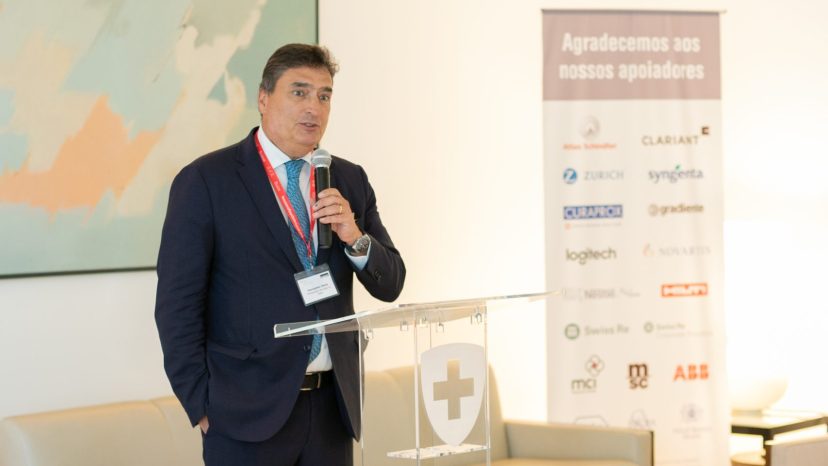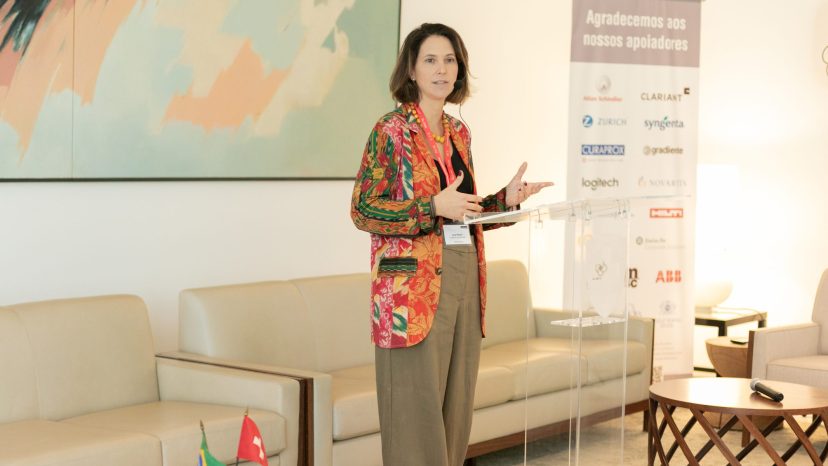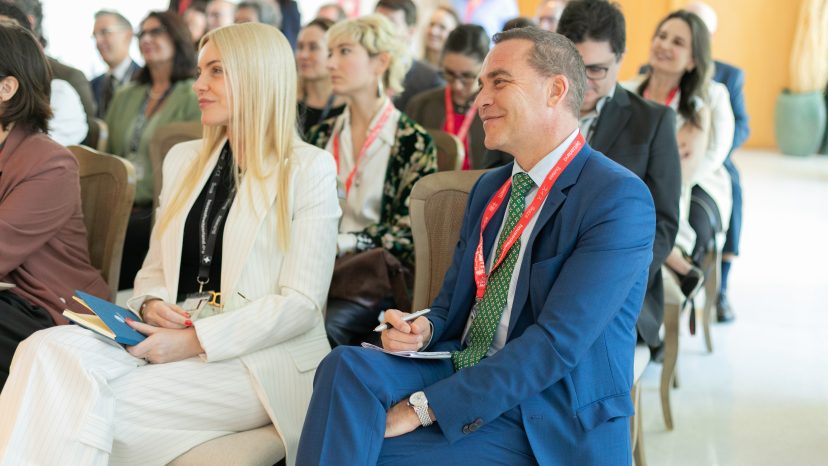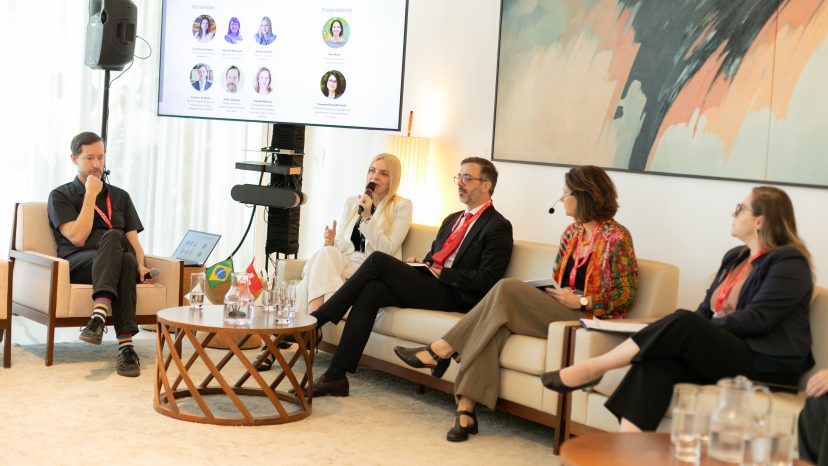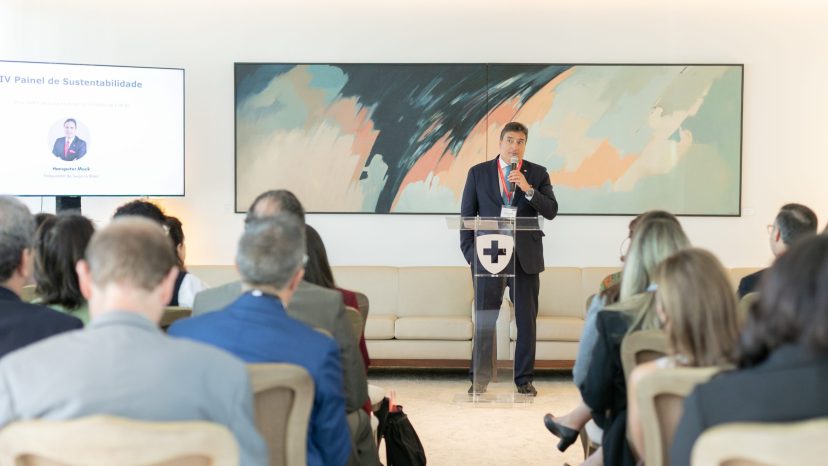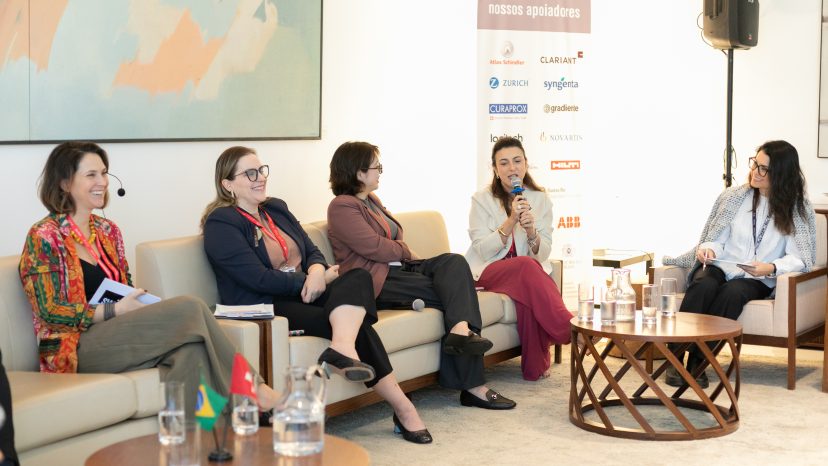On September 10, 2025, for the fourth consecutive year, the SWISSCAM Sustainability Committee and the Consulate General of Switzerland in São Paulo organized the Sustainability Panel at the Swiss Consular Residence in São Paulo.
The Consul General of Switzerland in São Paulo, Mr. Peter Hafner, welcomed everyone and gave the floor to the Ambassador of Switzerland to Brazil, Mr. Hanspeter Mock.
Ambassador Hanspeter Mock highlighted Switzerland’s efforts to promote sustainability in Brazil through the Road to Belém program, launched last year. On the occasion of COP30, various regional initiatives will be presented focusing on bioeconomy, sustainable water use, research, innovation, and the appreciation of traditional knowledge, with participation from the Swissnex teams and the Swiss cooperation agency based in Peru.
Despite logistical challenges and the high costs anticipated for COP30, which made it unfeasible to establish a Swiss pavilion in the event’s green zone, Switzerland will be present at the Museu Paraense Emílio Goeldi in Belém, among other activities. The program will conclude with the 3rd Brazil-Switzerland Infrastructure Forum in São Paulo in early December. The ambassador emphasized that the goal is to maintain engagement after COP, ensuring continuity for projects such as the renovation of Casa Goeldi.
Another key point of the speech was the imminent signing of the Free Trade Agreement between Mercosur and EFTA. The ambassador cautioned, however, that the signing is not the end of the process: ratification in Switzerland will require a popular referendum, as is customary in the country. He emphasized that it will be necessary to justify the agreement to Swiss society, especially regarding environmental and social commitments. For this, the continued engagement of Swiss companies in Brazil and the organization of events that help shape a well-informed public opinion about the treaty will be essential.
Finally, the ambassador thanked the Swiss partner companies and called out those not yet involved to participate in future projects. He reiterated the commitment of the embassy and Swiss consulates to strengthen ties with Brazil and keep the bilateral cooperation alive in the areas of sustainability, innovation, and trade.
Ana Moeri, CEO of Instituto Ekos Brasil and Vice President and Coordinator of SWISSCAM’s Sustainability Committee, opened the panel and thanked Ambassador Hanspeter Mock for his presence, highlighting the symbolism of his first event in office being linked to the environmental field. She also thanked Consul General Peter Hafner for once again offering the consular residence for the event, which has become a traditional space for sustainability discussions among Swiss member companies.
Ana highlighted the evolution of the panel over the past four years, becoming a flagship event for SWISSCAM, driven by the growing engagement of companies with the environmental agenda. She pointed out initiatives such as the Sustainability Award, held in 2023 at the Swiss Embassy, where Instituto Ekos Brasil developed the methodology to evaluate corporate best practices, as well as the Road to Belém program meetings in preparation for COP30. She also expressed gratitude for the crucial support of SWISSCAM’s gold member companies.
While contextualizing the panel, Ana pointed out that the event takes place during a time of major global transformations, with the advancement of regulatory frameworks related to climate, deforestation, and human rights, as well as trade agreements such as EFTA-Mercosur. According to her, the business sector is increasingly called upon to take a leading role—not only due to external demands, but as a structural part of corporate strategy. The panel, titled Desafios Globais para Práticas Empresariais e o Mundo em Transformação, was built upon the pillars of the Swiss-Brazilian Academy, a partnership between Instituto Ekos Brasil and the University of St. Gallen, supported by the Swiss Embassy, with a focus on companies. The pillars of this initiative are: corporate climate strategy; socio-environmental conservation and biodiversity; human rights in the business context; and responsible corporate conduct and evaluation of best practices.
Renata Amaral, Partner at Trench Rossi Watanabe, a collaborator in the Climate Commitment program, opened the discussions by highlighting that, despite the global scenario of political and economic instability, Brazilian companies remain firmly committed to their sustainability and diversity goals. She rejected the notion that “ESG is dead,” stating that organizations are using the international regulatory slowdown to strengthen themselves internally and “do their homework.” According to Renata, this period has served to deepen due diligence processes, review contracts and environmental clauses, improve certifications, and prepare evidence to demonstrate compliance with climate and social commitments. She recalled that even during the United States’ withdrawal from the Paris Agreement, the private sector maintained its targets unchanged, showing that corporate sustainability does not rely solely on government policies.
During the second part of her speech, Renata addressed the legal and structural challenges that hinder the expansion of environmental projects in Brazil. She mentioned that investors are more cautious and demand economic viability in carbon, biodiversity, and forest initiatives, leading to more conservative risk assessments. She pointed out obstacles such as the lack of tax incentives for regenerative agriculture, the absence of regulation regarding the free, prior, and informed consent of traditional and Indigenous communities, and serious land tenure issues that affect the legal security of projects. According to Renata, it is urgent for the Brazilian government to define clear protocols on what constitutes a regular area and to establish regulatory predictability. “Innovation walks hand in hand with risk,” she concluded, reinforcing that the maturation of the sustainable market depends both on legal stability and the courage to address these structural gaps.
Next, Cláudia Marconi, Professor of International Relations at Fundação Escola de Comércio Álvares Penteado, presented the Jean Monnet Centre of Excellence in Business and Human Rights, a pioneering initiative in the Global South co-financed by the European Union. The center brings together Brazilian and European professors, researchers, and professionals in a cooperative network focused on developing leadership in sustainability and corporate human rights. The project operates on two fronts: academic training through student and faculty exchanges, and professional development for the private sector in partnership with Instituto Ethos. According to Cláudia, the goal is to mainstream human rights into business and educational structures, making it an essential part of strategic decision-making and business curriculum.
Rafaela Mesquita, Talent & Culture Specialist at Zurich Insurance, emphasized the importance of giving greater visibility to the social pillar of ESG, which is often overshadowed by discussions on environment and governance. She explained that Zurich has a global culture focused on positive impact, structured around four commitments: to clients, partners, employees, and the planet. According to Rafaela, the social focus begins within the company, with policies on diversity, gender equity, and corporate education. The company offers English language instruction, support for undergraduate and graduate studies for employees, and sets inclusion targets—70% of promotions last year were awarded to women, and 75% of open positions were filled by internal talent. She also highlighted the importance of balancing mental and financial health to ensure well-being and productivity in the workplace.
Rafaela also presented external social impact projects, such as Zurich Forests, in partnership with Instituto Terra founded by Sebastião Salgado, which works to restore the Atlantic Forest; cooperation with BRK Ambiental to provide access to water and basic sanitation for communities in Tocantins; and Papo Cabeça, an initiative supporting youth mental health. She also emphasized Zurich’s support for the LGBT+ Pride Parade and digital literacy programs aimed at promoting technological inclusion for people in vulnerable situations. In her final remarks, she reflected on the concept of innovation, stating that more than creating new products, it is essential to invest in financial education to expand public access to protection and insurance services.
Representing the financial sector, Frederic de Mariz, Head of Sustainability for Latin America and Head of Argentina at UBS BB, stressed that sustainability is a business agenda, not a marketing one. He warned of the risks of greenwashing and highlighted the role of independent audits and certifications in ensuring market credibility. Frederic explained that the sustainable debt market in Brazil already accounts for around 15% of total issuances, a significantly higher percentage than in the United States, where it was only 3% last year. He viewed this as a positive sign, indicating that Brazil is closer to Europe in this regard, where the figure stands at around 25%. According to him, Brazilian executives are increasingly concerned with governance, social responsibility, and environmental issues, showing that in Brazil, the social and environmental dimensions go hand in hand in corporate strategies.
Frederic stated that Brazil is one of the major innovators in regulation, noting that the Brazilian Central Bank was among the first to incorporate environmental stress tests back in 2014, ahead of many other countries. He also mentioned that IFRS will be implemented in Brazil, which, although not the first, is among the leading countries in this process. As a third point, Frederic cited the carbon market, for which Brazil passed a bill in December of last year. He said he wishes the country already had a thriving carbon market, but that “it will happen.”
Carolina Carregaro, Director of Public Affairs at Nestlé Brazil, began her speech by highlighting the company’s global scale and proportional responsibility in sustainability matters. She explained that Nestlé operates in over 180 countries, with nearly 300,000 employees and around 500,000 producers. Brazil is a key market, with 18 factories, 20,000 employees, and 10,000 producers. Carolina cited three major global challenges that guide the company’s strategies: climate change, waste generation, and biodiversity loss. She described initiatives aimed at decarbonization, with a goal of achieving net-zero emissions by 2050, and energy transition through the use of biomethane, solar, and wind energy. She also emphasized Nestlé’s commitment to 100% recyclable packaging, support for 8,000 waste pickers in Brazil, and its leadership as one of the country’s largest recyclers.
Carolina also addressed the integration of sustainability, regulation, and public policy, noting that about 70% of the company’s emissions come from agriculture and that 90% of what reaches consumers’ tables originates from farming. She described work with coffee, cocoa, and milk producers based on indicators related to soil health, biodiversity, and water resources, and explained the long-standing partnership with Embrapa to adapt practices to the realities of tropical agriculture. She also discussed regulatory challenges involving the use of recycled plastics in contact with food, reporting on the dialogue with Anvisa that led to the approval of new standards, although domestic technology still needs to be developed to replace imports.
Heiko Spitzeck, Professor of Sustainability and Head of the Sustainability Center at Fundação Dom Cabral, began his remarks by categorizing companies into three levels of sustainability maturity: those not yet engaged, those focused solely on risk management, and those innovating strategically. He criticized the dominance of risk-based discourse, which he said originates in Europe and makes the topic discouraging. Heiko argued that Brazil has a genuinely committed business community using business as a force for good, citing examples like Sicredi, which developed credit lines for solar energy.
The professor also stated that Brazil’s central issue is social, not climatic, and that inequality must be addressed for sustainability to be effective. He shared experiences from executive programs in the Amazon, showing how sustainable income generation is essential to prevent deforestation. He advocated for a dialogue among equals, in which foreign companies also learn from local practices. Heiko praised the proactive stance of Brazilian companies like Gerdau, which anticipate new regulations and seek international certifications, but noted that most still adopt a reactive approach, doing only the minimum required.
Vanessa Boanada Fuchs, Director of the Institute of Management in Latin America at the University of St. Gallen, closed the panel by emphasizing the importance of multi-stakeholder engagement, which many companies now understand as essential not only for ensuring a reliable value chain but also for meeting regulatory requirements and leaving a positive environmental impact.
She also drew attention to the importance of two-way participation between companies and the public sector. According to Vanessa, Brazil faces structural issues—such as land tenure—that need to be discussed both internally within organizations and through dialogue with society and authorities. She explained that the country has a myriad of land use and ownership models, often unfamiliar to European legislators, and that companies are well positioned to interpret these complexities and act as bridges between the demands of new directives and international agreements and the Brazilian reality.
Finally, Ana Moeri and Vanessa Boanada presented the Swiss-Brazilian Academy, a new initiative born from the collaboration between Instituto Ekos Brasil and the University of St. Gallen, with support from the Swiss Embassy. The project is a continuation of the Swiss Sustainability and Innovation Award held in 2023, and now evolves into a permanent training and cooperation platform. According to Ana, the academy aims to create a space to support Swiss and Brazilian companies in their sustainability journeys. She explained that throughout the panel, it became clear that organizations are at different stages of maturity, and the academy intends to accompany, train, and connect these diverse profiles, fostering mutual learning and joint actions focused on corporate sustainability.
The first step of the initiative will be a diagnostic study conducted by Instituto Ekos to assess the sustainability maturity level of Brazilian companies and identify their main pain points, challenges, and opportunities for progress. Ana emphasized that this assessment will be based on methodologies already used by the Institute in decarbonization projects, socio-environmental evaluations, and collaborative business networks, such as the Compromisso com o Clima program. The information collected will serve as the foundation for building a training program tailored to the local context, ensuring that the academy’s content is practical and applicable. She reinforced that all data from participating companies will be kept confidential and used solely for research and planning purposes within the academy.
Vanessa then presented the contribution of the University of St. Gallen, one of Europe’s most renowned institutions in the field of business, which has integrated sustainability as a cross-cutting theme across all its schools. The university will bring to the academy an approach focused on stakeholder engagement, adaptive governance, and holistic ESG practices. Vanessa explained that the Swiss-Brazilian Academy is designed to be a space for cross-sector dialogue, bringing together companies, academia, and civil society to collaboratively build an innovative bottom-up curriculum—developed from the real experiences, challenges, and best practices of Brazilian companies, rather than solely from top-down regulatory standards and requirements.
The academy will be structured into four intensive modules spread over one academic year, with hybrid activities to accommodate participation from companies across different regions of Brazil. There will be an in-person retreat lasting three days, dedicated exclusively to the practical implementation of projects developed by participants. According to Vanessa, learning will be continuous and appliable: the goal is for each cohort to generate concrete, measurable projects with real impact, capable of strengthening sustainability culture within organizations and inspiring new forms of business collaboration.
In addition, the program includes peer learning opportunities, allowing participating companies to exchange challenges, solutions, and cooperation prospects—such as joint financial education projects. The first phase of the study began in August 2025 and is expected to conclude by November, with the official launch of the Swiss-Brazilian Academy scheduled for COP30 in Belém, Pará, supported by Swissnex and the Swiss Embassy. The first cohort will begin in February 2026, with activities running through October of the same year.
The initiative aims to establish a lasting dialogue between companies and institutions. It also envisions the creation of an alumni network, enabling participants to share experiences and continue collaborating. “The idea is for the Academy not to form just one generation, but generations of new leaders—and for those generations to remain connected,” Vanessa stated.
We would like to thank everyone who attended, the Consulate General of Switzerland in São Paulo for their partnership in organising this event and the Gold members who are our supporters, as well as the gifts offered by Logitech and Nestlé.

